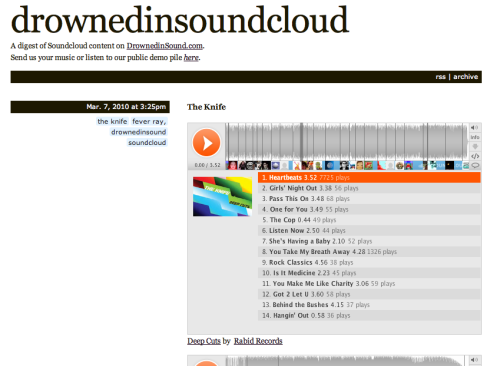SPECIAL LIVE EVENTS AND DEBATES AND UNIQUE CONTENT ANNOUNCED
Drowned In Sound, the UK’s original music website, is ten this year and to celebrate a decade of debate, dissent and deliberation on the merits of a multitude of musics, founder and owner Sean Adams will be announcing a plethora of events and special coverage on the site. Ten years since its inception the site boasts more than half a million users per month.
Drowned In Sound was born on 10th October 2000 in the bedroom of Sean Adams. Originally a hobby, the site soon took on greater significance as Sean pioneered the idea of a community of music minds through the site messageboards and offered new and emerging artists an outlet for coverage that seemed to be lacking in the wider music media at the time. On the anniversary itself, Sean Adams will host a special Drowned In Sound 6 Mix on BBC Radio 6 that will feature 20 landmark songs from ten years of DiS alongside a few special exclusives from friends of the site such as Erol Alkan and James Lavelle.
The link between artists and Drowned In Sound has been a constant story of the last ten years, from Bloc Party forming on the messageboards to the likes of Tom Smith of Editors joining the debate on his band, interactivity between like minds and opposing viewpoints, critics, artists and fans has been a hallmark of Drowned In Sound that now seems the norm across the online landscape. As part of the birthday celebrations, keep an eye out for DiS’ greatest debates, revisiting some of the great arguments and spats between artists and the individuals on the messageboards. Whilst everyone now talks about breaking down barriers and creating communities, it was Drowned In Sound that started this process, way back at the beginning of the decade.
Given the sheer passion for music that created the site and continues to power it, there should be no surprise that Drowned In Sound spawned an attendant label that was responsible for the debut Kaiser Chiefs single and albums and singles from such luminaries as Martha Wainwright, Brett Anderson, Metric, Blood Red Shoes and Emmy The Great amongst others. Having made a mark on the music landscape from the start of the decade, this second string to the Drowned In Sound further developed the idea of breaking down the traditional walls between media that continues to be a hallmark of the site.
The influence of Drowned In Sound on the British music landscape is hard to over-estimate. Alongside countless innovations now recognised as standard for websites, Drowned In Sound alumni have spread across the media industry with James MacMahon of NME, Terry Bezer of Metal Hammer, Mike Diver at the BBC and countless blog writers and music media freelancers all starting their careers on the site. It is no surprise that Sean Adams has been listed as one of the 10 Music people in the Hospital Club 100 most influential people in media and one of the 30 Under 30 Power Players in the Modern Media in The Sunday Times, with Steve Lamacq observing: “Sean is an ideas man, He grasped early on that there were communities of fans being drawn together online.”
The birthday will be marked by a host of special coverage on site and DiS live events, including a DiS stage at Summer Sundae, the site’s 50 favourite people discussing their favourite albums, a rerun of the greatest online spats from the last decade with a host of other shows, coverage and special moments to be announced.
FOR MORE INFORMATION contact LOUDHAILER PRESS
Lewis Jamieson - 07718 652582 / 020 8714 0139 lewis@loudhailerpress.com
www.drownedinsound.com
www.loudhailerspeaks.blogspot.com











